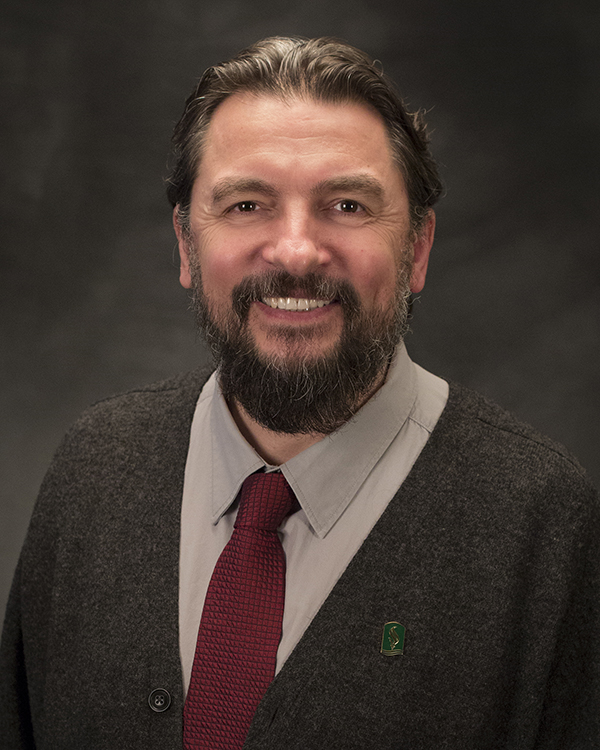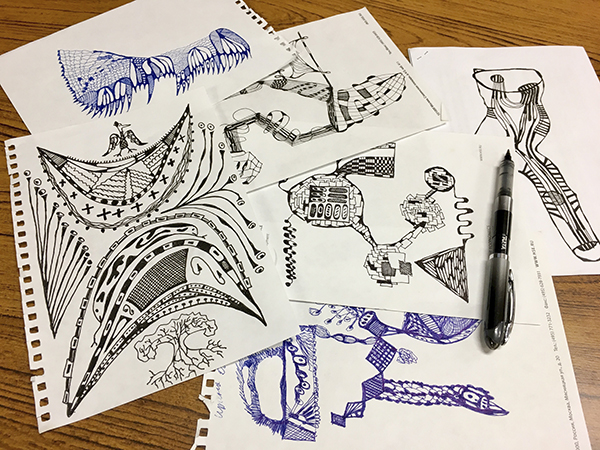 Dean Alexander M. “Sasha” Sidorkin took the helm at the College of Education in February. (Sacramento State/Jessica Vernone)
Dean Alexander M. “Sasha” Sidorkin took the helm at the College of Education in February. (Sacramento State/Jessica Vernone) Dean Sidorkin says his elaborate doodling makes him a better listener.
Dean Sidorkin says his elaborate doodling makes him a better listener.Alexander M. “Sasha” Sidorkin, the new dean of the College of Education, is a doodler extraordinaire. His intricate ink illustrations could be pages in a coloring book or blueprints for wacky Rube Goldberg-like inventions.
His wife, a print and fiber artist, persuaded him not to throw away his drawings when they left Russia for Sacramento a few weeks ago. Her prints decorate the walls of his Eureka Hall office, and a stack of his elaborate drawings occupies a bookcase.
“If I don’t doodle, I’ll spin a paperclip or tear pieces of paper,” Sidorkin says while absentmindedly shredding a legal pad. “People think I’m not listening, but in fact, that’s what I do when I’m most intensely listening. I remember better when I doodle.”
He also is a prolific bilingual blogger who posts his expansive thoughts in Russian and English on “The Russian Bear’s Diaries” (sidorkin.blogspot.com). Lately, he has pondered the psychometrics of simplicity, lone-thinker syndrome, how to handle combative emails, and “taking stock of the good things,” including the faculty and students in his new college. In addition, he has written five academic books and 75 papers.
Sidorkin, whose first day at Sacramento State was Feb. 6, came here from HSE University in Moscow, where since 2013 he was the dean of the Graduate School of Education and director of the Center for the Study of Innovations in Education.
He and his wife, Svetlana Sidorkina, previously lived in the United States for 22 years, while he attended graduate school and began his academic career.
“This is my sixth state in the United States that we’re going to be living in, and I’ve never lived in California, although I came to visit many times,” he says. “It looks like the perfect place: It doesn’t snow (in Sacramento). It’s warm. And also California has the reputation of being progressive and on the cutting edge of many things. I wanted to be at a place where things are changing faster.”
Growing up in Siberia
Sidorkin grew up in Novosibirsk, an industrial city in western Siberia. His father worked at a factory that made parts for nuclear-power stations and processed uranium used in nuclear weapons; his mother was a payroll clerk for a construction company.
As children, Sidorkin and his older brother, Konstantin, spent summers on their grandfather’s farm.
“His trade, going back several generations, they were butchers,” Sidorkin says. “They slaughtered animals and then butchered them. He had a respectful, intimate relationship with the animals that he killed. My brother and I were never allowed to watch. It was a private affair.”
The brothers were the first in their family to finish college. Konstantin is a computer numeric-control engineer and lives in Russia with his family.
Sasha Sidorkin graduated from Novosibirsk State Teachers University in 1985 with a double major: teacher of history and government, and youth development. In 1991, he earned a doctorate in education from the Research Institute for Theory and History of Education, in Moscow.
“In Russia,” he says, “the rate of higher education attainment was very high. It’s one of the highest in the world. When I graduated (from high school), 20 percent nationwide went to college. Now in Russia, about 75 percent of kids go to college. The Soviet Union was good at providing higher education. It was terrible at other things, but not bad at education.”
His graduate school advisor gave him an application to study at the University of Notre Dame, where Sidorkin would earn a master’s degree in peace studies in 1992.
“When we first left in 1991, Russia was in very serious trouble, both politically and economically,” he says. “So, when an opportunity came to study in the States, you know, we didn't hesitate. You probably don’t realize what proportion of the world population dreams of immigrating to the United States, whether they admit it or not. In Russia in 1991, everybody who could came here, so that’s why we have so many Russians living here.”
Just after completing his studies at Notre Dame, Sidorkin set off on a cross-country adventure that could have changed the course of his life.
“One of my classmates was from Seattle, and he suggested that we go sign up to work on a fishing boat, make some money, and then go home,” Sidorkin says. “We thought it was a splendid idea, so there were two friends with me – one was from Kenya, and the other from Sri Lanka. And we had this fancy, white convertible, a drive-away car, and took a road trip from Notre Dame to Seattle. We couldn’t get work on a fishing boat, because it was a bad salmon season or something. So instead, I applied to graduate school at the University of Washington, and the rest is history.”
He earned his doctorate in education at Washington in 1996 and stayed on as a research associate for three years before taking a teaching position with the Educational Foundations and Inquiry program at Bowling Green State University. From there, he went to the University of Northern Colorado to run the School of Teacher Education. Following that was a three-year stint as dean of the Feinstein School of Education and Human Development at Rhode Island College.
The Sidorkins’ children have followed in their father’s academic footsteps. Maria, who has a 4-year-old daughter named Alice, recently defended her doctorate at Yale University and is in the post-doctorate program at Harvard University. Her brother, Gleb, is finishing up his doctorate studies at Harvard.
Getting to know Sacramento
Since arriving in Sacramento in late January, Svetlana and Sasha have been busy exploring the city’s art scene.
“So, since I’m married to an artist, I usually am being dragged along the art shows in the area,” he says. “For example, we went to ArtStreet. We didn’t have our furniture yet, but we went to ArtStreet, which was fun.
“We already went around the town. It’s beautiful. The faculty gave me a map of the places in Sacramento to visit, their personal recommendations. And we like to go to the theater. We like to walk and hike, and drive to see nature. I try to read when I can, but I don’t have much time for it.”
Sidorkin is at the helm of the College of Education, which has educated the region’s teachers since Sacramento State’s founding in 1947. The college granted 519 teaching credentials during the 2015-16 academic year.
“I think the college is strong,” he says. “The potential and the achievements are already very good. Part of my job is to help package and sell it to the outside world, and to create a coherent image of this college. We also need to attract the attention of potential donors. It should have somebody’s name in front of the College of Education. If we do that, it will enable us to grow and move further.
“There are a lot of innovative things that went on here, and now we have several major grants worth millions of dollars. So, if we can find a theme that unites them all and maybe create some synergies among all the projects, that would really move us forward.” – Dixie Reid
